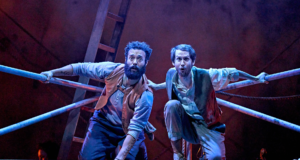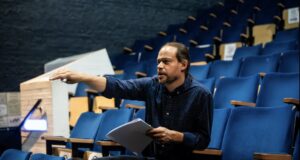Henry Roberts discusses his show Close Enough to Touch
Henry Roberts is a queer writer and photographer from Lancashire now living in London. He was a member of the Young Vic’s 2022 cohort of young theatre-makers, a finalist of Soho Theatre’s Verity Bargate Award and long-listed in the RSC’s 37 Plays project and by the Traverse Theatre.
His work explores questions of memory, identity and intimacy in an uncertain world. His latest play, Close Enough To Touch, comes to Theatre503 next week for two nights only, so the perfect time to catch up with Henry to find out more.
Can you tell us a bit about your play Close Enough to Touch?
In a sentence, Close Enough to Touch is a one-person play about cruising. In a slightly longer sentence, it’s a play about shame and sexuality and the things we do to find pleasure when we don’t have the vocabulary to express our desires. I was really interested in the idea that there are spaces – public toilets – where people almost live out a secret fantasy life. It’s anonymous, it’s secret, it’s both public yet intimately private. I thought that was a fascinating subject for a play in and of itself, but also metaphorically it was a great way to explore those themes of shame and liberation, secrecy and intimacy. (There are also jokes!).
How did you get into writing? Which playwrights or other figures inspire you?
I wrote my first play as an undergraduate. Before I ever wrote a play, I wrote a lot of poems, short stories, short scenes – which were all painfully bad and utterly forgettable. But I’d also always loved going to the theatre and so when I found myself at university surrounded by people who shared the same interests as me and who wanted to put on shows, I decided to dedicate myself to writing a full play. Since graduating, I’ve been writing plays and trying my best to put them on – which is not easy. Sadly, it’s getting harder and harder as the theatre landscape grows more risk-averse and opportunities for new writing continue to shrink. I also write articles on a variety of topics for newspapers and magazines, but playwriting is my favourite creative outlet.
The playwrights that I really admire are the ones who create their own language. There are those writers who manage to shape English in their dialogue and give the characters’ voices such a distinctive rhythm – the language sounds off, it doesn’t sound like how we speak in real life. But it’s effective and it creates a mood, usually one of unease, that lingers through the play and helps build tension and discomfort. I love writers who feel free to shape English however they please. (They’re usually the ones who end up with a million imitators.) So people like Marina Carr, Annie Baker, Caryl Churchill, Harold Pinter… I could name hundreds more writers I admire (Chekhov, Moira Buffini, Yasmina Reza) but I’ll stop there!
You moved from Lancashire to London, did this influence or shape your writing?
Definitely. I think it’s hard not to be influenced by your upbringing, either consciously or unconsciously. I set a lot of my plays in Lancashire, a couple in my hometown of Whalley. We’ve seen enough plays about posh people drinking whiskey in London sitting rooms. Most of my formative experiences were in Lancashire: it’s where I went to school, it’s where I hung out with friends, it’s where I fell in love for the first time, it’s where I’ve cried too many times to count. These experiences always end up resurfacing in drama. Does that mean they have to be set in the same place? Of course not. But for me, I want to put Lancashire onstage when I can – and show off the good things about it as well as the bad.
Moreover, I also just love the northern way of talking. There’s a beautiful rhythm in the Lancashire dialect and the comedic timing it offers is wonderful. This new play is set in London, but it’s about an outsider who’s new to the city and finds himself lost. I don’t think I could ever write a play about the London elite.
As a writer and photographer, do you find that your work in one medium influences your creative process in the other?
That’s a good question. I’m not sure if they influence each other, but they are both interested in the same things. Namely, a sense of intimacy with another person. A photograph and a piece of writing are very intimate things that get shared with the world. I’m interested in working through the same topics in both aspects of my work, namely sexuality, love, identity, fear and loneliness. Funnily, the acts of writing and taking photographs for me are actually quite similar. In the sense that they’re both a solitary act but ones that depend on other people. I write alone, but a play only comes alive when other people get involved and bring their own perspectives to it. Likewise, I’m the only one behind the camera clicking the shutter, but I need someone in front of me, someone to interact and respond with. I’m a shy person, but I feel much more confident when I’m at the keyboard or can hide behind a camera. It’s my way of engaging with other people and sharing something secret with the world.
You write about the exploration of memory, identity and intimacy in an uncertain world. What motivates you to explore these specific topics?
Well, firstly, because I think they’re fascinating. Particularly memory. I’m a bit obsessed with the idea that we replay so much of our lives in our own heads, reliving events over and over again, inevitably distorting the memories in the process. I’ve always found the conflict between what goes on in our heads and what happens in ‘the real world’ very compelling. However, in artistic terms, memory is a really interesting topic because it allows you to play with form and structure. Just as I like writers who play with language, my favourite writers are the ones who subvert our expected notions of form: the ones who tell non-linear stories, who make us question the very idea of narrative. These works of art are almost always way more interesting and when you take the fallibility of memory as a starting point, that allows you to do some really interesting things with form. It’s something I’ve tried to do in previous works: distort the narrative time to reflect a character’s internal sense of time. I’m not sure I did a great job with that one, but it’s certainly something I find interesting.
Looking ahead, are there any other themes or topics you are interested in exploring in your future works?
Close Enough to Touch is my first play I’d describe as ‘queer’. I’ve dabbled in some of these themes in previous works, but this was the first time I wrote something where that was front and centre. Naturally, this reflects my own journey with that word and that identity. There’s something both scary and liberating using these words, and it’s something I’d like to write about more in the future.
Moreover, I would love to write something with a bigger cast. The productions I work on presently are almost exclusively one or two-handers, as budget restrictions prevent me from producing works with a large cast. The cost of mounting a production is rising; performances are encouraged to be made as quickly as possible and I have been advised by more than one professional producer to concentrate solely on plays with only one or two characters, as this will increase chances of receiving funding. I’d love to be put on a production with lots of characters – I have a few stories in mind – but at the moment I don’t see how that’s going to be financially feasible. Maybe a few decades ago, but certainly not now. I’m not particularly optimistic about the theatre landscape at the minute, in London at least.
What do you hope your audience will take away from Close Enough to Touch?
I hope people come away recognising something of themselves in the story. Even if the events and settings of the play are a million miles from people’s lived experience, I hope audiences will still recognise the feelings of shame, of secrecy, of the pressures of labelling yourself… My hope is that the play is engaging because it shows most people something they’ve never seen before but memorable because it touches on something universal. (I also hope they laugh at the right places…)
Thanks to Henry for his time. Close Enough to Touch plays at Theatre503 12 and 13 March. Further information and bookings can be found here.
 Everything Theatre Reviews, interviews and news for theatre lovers, London and beyond
Everything Theatre Reviews, interviews and news for theatre lovers, London and beyond



